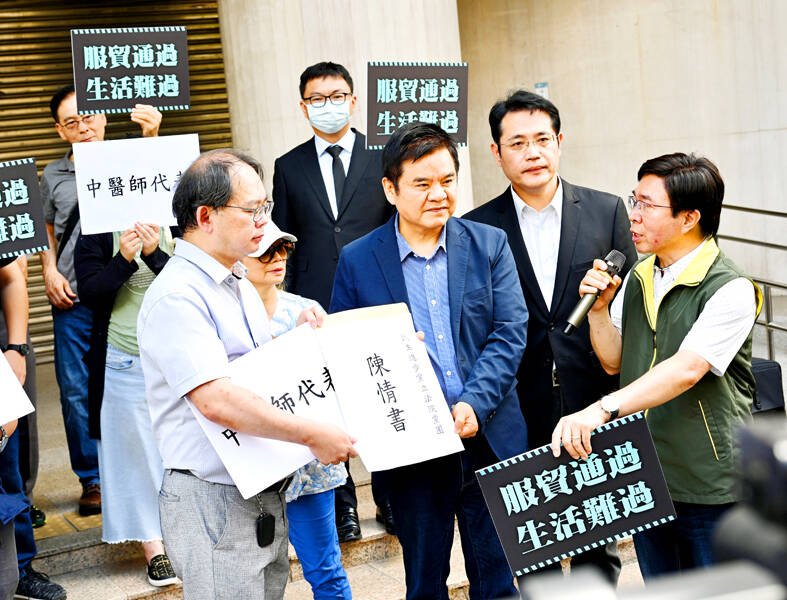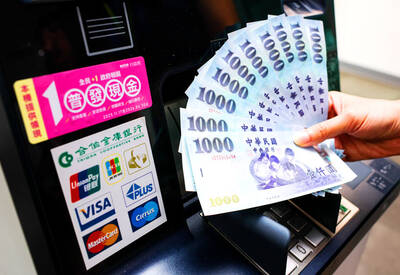Representatives of traditional Chinese and Western pharmaceutical companies and Chinese traditional doctors yesterday held a news conference in front of the Legislative Yuan to express their opposition to restarting the cross-strait service trade agreement.
National Union of Chinese Medical Doctors’ Association secretary-general Chen Po-yuan (陳博淵) said that the agreement would be a “poison” to the industry and is “rotten to the core,” adding that they hoped the Chinese Nationalist Party (KMT) and the Taiwan People’s Party (TPP) could understand the industry’s stance on the matter.
Taiwan-trained traditional Chinese medicine doctors of excellent quality could be drawn to practice in China and vice versa, which could diminish the quality of medical services in Taiwan, he said.

Photo: Lo Pei-de, Taipei Times
If approved, the agreement would diminish the quality of medical services and harm people’s health, he added.
Both the KMT and the TPP presidential candidates, New Taipei City Mayor Hou You-yi (侯友宜) and former Taipei mayor Ko Wen-je (柯文哲) respectively, have proposed restarting talks on the agreement, which failed to be passed after sparking an occupation of the Legislative Yuan by student-led Sunflower movement protesters from 9pm on March 18, 2014, to April 10 at 6pm.
Commenting on the lack of members of political parties at the protest, Chen said he did not know if the caucuses understood what the agreement’s impact on the traditional medicine sector would be.
Traditional medicine pharmaceutical sector representative Hsiao Hung-chih (蕭宏誌) said the pact, if approved, would significantly affect Taiwan’s traditional Chinese medicine supply chain, and eat into an already withering market and number of employees in the industry.
Representatives of the pharmaceutical sector manufacturing Western medicine also said their industry would be greatly affected, as low-priced Chinese products would present intense competition and Chinese-funded companies would drain Taiwan of its talent and technologies.
Industry representatives said that low-priced, low-quality pharmaceutical goods manufactured by Chinese companies — but bearing the “made in Taiwan” hallmark — would significantly damage Taiwan’s standing in the pharmaceutical industry.
Democratic Progressive Party Legislator Chuang Jui-hsiung (莊瑞雄) said that his party has heard the voice of the people and “would not allow” the agreement to be approved.
Democratic Progressive Party Legislator Chiang Yung-chang (江永昌) said the party stands with the industry, as China is already the primary source of traditional Chinese medicine reagents and materials.

The Central Weather Administration (CWA) today issued a sea warning for Typhoon Fung-wong effective from 5:30pm, while local governments canceled school and work for tomorrow. A land warning is expected to be issued tomorrow morning before it is expected to make landfall on Wednesday, the agency said. Taoyuan, and well as Yilan, Hualien and Penghu counties canceled work and school for tomorrow, as well as mountainous district of Taipei and New Taipei City. For updated information on closures, please visit the Directorate-General of Personnel Administration Web site. As of 5pm today, Fung-wong was about 490km south-southwest of Oluanpi (鵝鑾鼻), Taiwan's southernmost point.

Tropical Storm Fung-Wong would likely strengthen into a typhoon later today as it continues moving westward across the Pacific before heading in Taiwan’s direction next week, the Central Weather Administration (CWA) said. As of 8am, Fung-Wong was about 2,190km east-southeast of Cape Oluanpi (鵝鑾鼻), Taiwan’s southernmost point, moving westward at 25kph and possibly accelerating to 31kph, CWA data showed. The tropical storm is currently over waters east of the Philippines and still far from Taiwan, CWA forecaster Tseng Chao-cheng (曾昭誠) said, adding that it could likely strengthen into a typhoon later in the day. It is forecast to reach the South China Sea

Almost a quarter of volunteer soldiers who signed up from 2021 to last year have sought early discharge, the Legislative Yuan’s Budget Center said in a report. The report said that 12,884 of 52,674 people who volunteered in the period had sought an early exit from the military, returning NT$895.96 million (US$28.86 million) to the government. In 2021, there was a 105.34 percent rise in the volunteer recruitment rate, but the number has steadily declined since then, missing recruitment targets, the Chinese-language United Daily News said, citing the report. In 2021, only 521 volunteers dropped out of the military, the report said, citing

Nearly 5 million people have signed up to receive the government’s NT$10,000 (US$322) universal cash handout since registration opened on Wednesday last week, with deposits expected to begin tomorrow, the Ministry of Finance said yesterday. After a staggered sign-up last week — based on the final digit of the applicant’s national ID or Alien Resident Certificate number — online registration is open to all eligible Taiwanese nationals, foreign permanent residents and spouses of Taiwanese nationals. Banks are expected to start issuing deposits from 6pm today, the ministry said. Those who completed registration by yesterday are expected to receive their NT$10,000 tomorrow, National Treasury